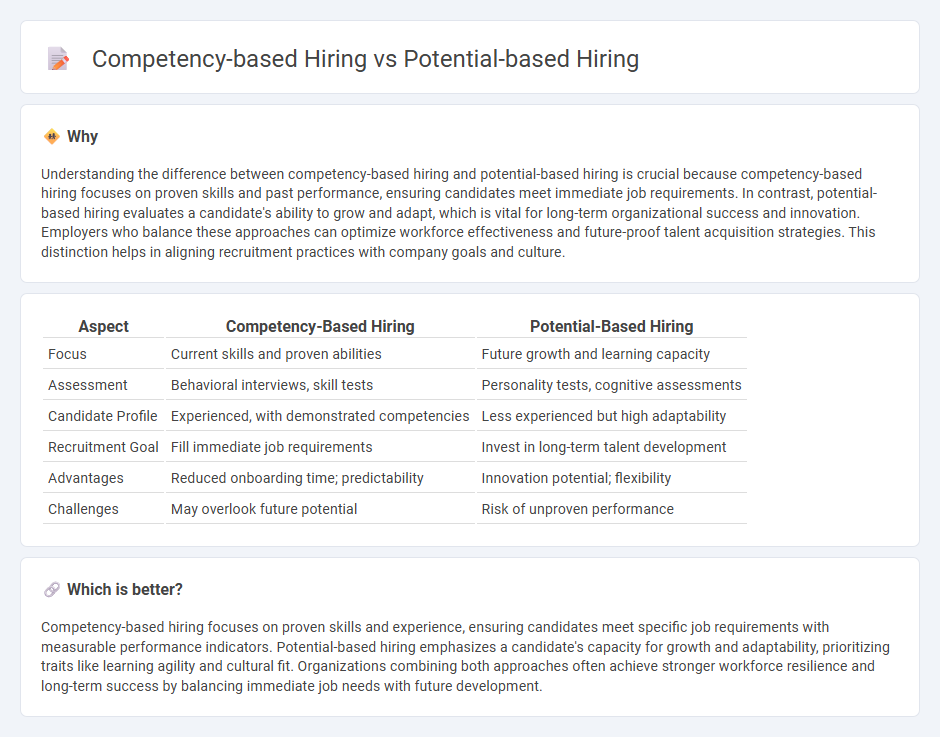
Competency-based hiring focuses on evaluating candidates' existing skills and proven experience to ensure job-specific performance, while potential-based hiring emphasizes the candidate's ability to grow, adapt, and develop new competencies over time. Organizations leveraging potential-based hiring often gain access to innovative thinkers and future leaders who can evolve within dynamic markets. Discover how balancing these approaches can optimize your talent acquisition strategy.
Why it is important
Understanding the difference between competency-based hiring and potential-based hiring is crucial because competency-based hiring focuses on proven skills and past performance, ensuring candidates meet immediate job requirements. In contrast, potential-based hiring evaluates a candidate's ability to grow and adapt, which is vital for long-term organizational success and innovation. Employers who balance these approaches can optimize workforce effectiveness and future-proof talent acquisition strategies. This distinction helps in aligning recruitment practices with company goals and culture.
Comparison Table
| Aspect | Competency-Based Hiring | Potential-Based Hiring |
|---|---|---|
| Focus | Current skills and proven abilities | Future growth and learning capacity |
| Assessment | Behavioral interviews, skill tests | Personality tests, cognitive assessments |
| Candidate Profile | Experienced, with demonstrated competencies | Less experienced but high adaptability |
| Recruitment Goal | Fill immediate job requirements | Invest in long-term talent development |
| Advantages | Reduced onboarding time; predictability | Innovation potential; flexibility |
| Challenges | May overlook future potential | Risk of unproven performance |
Which is better?
Competency-based hiring focuses on proven skills and experience, ensuring candidates meet specific job requirements with measurable performance indicators. Potential-based hiring emphasizes a candidate's capacity for growth and adaptability, prioritizing traits like learning agility and cultural fit. Organizations combining both approaches often achieve stronger workforce resilience and long-term success by balancing immediate job needs with future development.
Connection
Competency-based hiring focuses on evaluating candidates' specific skills and experiences directly related to job performance, while potential-based hiring assesses a candidate's capacity for growth and adaptability within the role. Both approaches aim to optimize workforce effectiveness by aligning employee capabilities with organizational goals, ensuring not only immediate job fit but also future development. Integrating competency and potential assessments leads to more strategic talent acquisition, enhancing employee retention and long-term productivity.
Key Terms
Growth Mindset
Potential-based hiring prioritizes candidates' capacity for learning, adaptability, and future performance, emphasizing growth mindset traits such as resilience and openness to feedback. Competency-based hiring assesses current skills and proven expertise, focusing more on past achievements and technical qualifications. Explore how integrating growth mindset principles into hiring practices can transform workforce development and innovation.
Skills Assessment
Potential-based hiring emphasizes evaluating a candidate's ability to learn, adapt, and grow within a role, focusing on future capacity rather than current expertise. Competency-based hiring targets specific skills and experiences demonstrated through past performance, using structured skills assessments to match job requirements. Explore more insights to understand which hiring strategy best aligns with your organizational goals.
Learning Agility
Potential-based hiring emphasizes candidates' capacity for rapid learning and adaptability, prioritizing learning agility as a key predictor of future performance in evolving roles. Competency-based hiring focuses on assessing specific skills and experiences that align with current job requirements, which may overlook an individual's ability to quickly acquire new capabilities. Explore further how integrating learning agility into hiring strategies can enhance talent acquisition outcomes.
Source and External Links
Should You Hire for Potential or Experience: Pros and Cons - Hiring for potential prioritizes candidates' future capabilities like adaptability and problem-solving over existing skills or experience, emphasizing attributes that predict long-term growth, which is particularly useful in rapidly changing industries.
Why You Should Hire for Potential (Not Experience) - Hiring for potential involves identifying core skills and traits that indicate success and focusing on learning aptitude, supported by clear career paths and development opportunities to unlock talent growth within organizations.
Potential Vs. Experience: What Is More Important When Hiring? - Hiring for potential expands the candidate pool and increases diversity by valuing willingness to learn and cultural fit, often leading to higher retention, employee motivation, and innovation compared to hiring based solely on experience.
 dowidth.com
dowidth.com